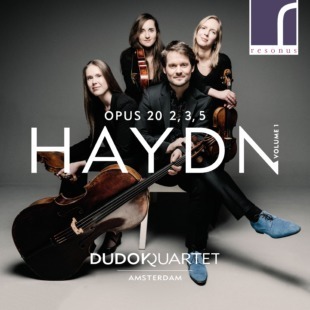
Haydn Op 20 String Quartets Nos 2, 3 & 5 on Resonus Classics
At once the Dudok impresses with its responsiveness to gesture, not playing games with tempo but allowing the pulse to yield gently as the four-way conversation develops… This is chamber music for friends, not concert music for an audience … Throughout the disc the listener is drawn in closer as the stories become more personal… All is played with true assurance and understanding; and this ensemble’s care for structure is worthy of its architect namesake.
David Threasher, The Strad, January 2020
One of the lasting pleasures of this recording from the Dudok Quartet of Amsterdam is how well the musical argument is spread between the players… These are glorious performances, beautifully recorded and produced. Four rational people, conversing with eloquence, intelligence and absolutely no shouting. What could be better?
Graham Rickson, The Arts Desk, 2 November 2019
…exemplary recordings of the string quartets opus 20: music with a deceptive and unparalleled simplicity and nobility and above all an enigmatic, immeasurable depth and lightness, that is, for the attentive listener, forever surprising and uplifting.
God, how beautiful this is.
Erik Voermans, Het Parool, 21 October 2019
We have seen before that these players can take on just about anything… The Dudok Quartet has combined repertoire from different style periods over the past few years (Mozart with Ligeti, Mendelssohn with Weinberg), resulting in a series of highly successful albums.
The players show once again the elegance in their interaction. They delicately topple over each other in the faster movements. The slow movements sound subdued but never collapse.
The fugal finales of the second and third quartets are subtle in their choice of tempo and played with crystal clear sound. Hopefully this album is the first in a long series of Haydn recordings.
Maartje Stokkers, De Volkskrant, 11 October 2019
Always alert to Haydn’s myriad caprices, [the Dudoks] introduce some perfectly placed, sinuous phrasing in the third movement of No 3 in G minor, and real verve and colour in its brilliant allegretto. There is an elegant poise to the minuet and trio of No 5 in F minor, then aching dignity in the adagio. Quartets 2 and 5 in the Op 20 set end with a fugue, played sotto voce and at breakneck speed, just one of Haydn’s playful innovations so brilliantly captured here by the Dudoks and beautifully recorded.
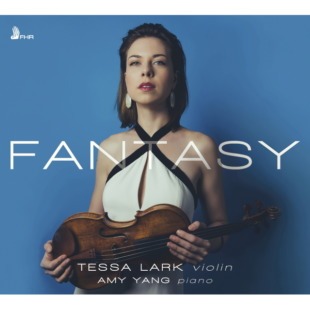
Fantasy
Fantasies by Telemann, Schubert, Kreisler, Ravel and Tessa Lark
with Amy Yang piano
…in the piece she composed, Appalachian Fantasy, the cultured, stylish classical violinist is revealed as — a fiddler. Everything on the disc is well played, but this quasi-folk music, which yields everything it’s got at the first hearing, will make your heart sing with joy.
David Reznik, Fanfare, September/October 2020
… a stunning solo CD debut … ravishing tone and perfect style – and a simply dazzling and passionate performance of Ravel’s Tzigane – Rhapsodie de concert. It’s a recital of the highest caliber.
The WholeNote, December 2019/January 2020
This program reveals the versatility of the performers. I deeply loved the Kreisler, the energy and sparkle of the Telemann pieces, the gypsy spirit of the Ravel, and the sound and style of Yang’s Schubert. This recording contains some of the best playing I have ever heard.
Ned Kellenberger, American Record Guide, December 2019
Lark and Amy Yang (piano) enjoy the playfulness here [Schubert Fantasie], and both instruments have alot to show off about in the challenging variations. Lark then follows the Schubert with a real treat – her own composition, Appalachian Fantasy, highlighting another side to her musical heritage as a traditional fiddler. With her violin retuned to produce the traditional open string double-stopping drones, she draws on the melody from the Schubert, as well as bringing in traditional Appalachian tunes … in a fabulously infectious demonstration of her phenomenal talent here. Ravel’s Tzigane is a bravura showpiece for violin, although again, the piano part is not to be sniffed at, and Yang rises to its challenges well. Lark throws off the virtuosic gypsy flourishes with appropriate abandon, making this a lively and exuberant finish to the disc. All in all, this is a highly impressive calling card, amply demonstrating the range of Lark’s talents.
Nick Boston, Classical Notes, November/December 2019
Tessa Lark includes three concise Fantasies by Telemann on her debut recital disc, each one a pithy sequence of linked sections. They’re highly engaging and melodically rich. Especially the A major one, its six short movements lasting barely five minutes. I found myself bingeing on all three, repeatedly and with no ill effects… As a bonus, the Kentucky-born Lark throws in her own Appalachian Fantasy. Wittily recycling the same Schubert song which crops up in his Fantasie, Lark throws a couple of Appalachian folk tunes into the mix. The technical brilliance is worn lightly, Lark sounding just like a folk fiddler letting her hair down.
Graham Rickson, The Arts Desk, 23 November 2019
So now here is Fantasy, and it’s every bit as strong as one would have expected. Conceptually, as the title suggests, it’s a celebration of the flights-of-imagination, free-form composition known as the fantasy. Repertoire-wise, it’s wide-ranging: four centuries, with Telemann at one end, and Lark’s own Appalachian Fantasy of 2016 at the other. In fact those two offerings encapsulate Lark’s qualities rather neatly: ‘modern’ Telemann readings whose lightness and dance quality feels as indebted to Lark’s Bluegrass folk-fiddling roots as to her lightly worn historical awareness, and with their contrapuntal writing beautifully voiced. Then her Appalachian Fantasy, a superbly coloured, multifaceted folk medley vividly evoking the vast plains of her home turf, complete with an opening which also cleverly honours the previous Schubert Fantasie (which itself is played with immense sensitivity by her and Yang) by translating his song into Kentucky tongue. Add a strong Tzigane – equally in tune with her own folk roots – and I’m already looking forward to whatever Lark does next.
Charlotte Gardner, The Strad, December 2019
On the evidence of this musically engaging programme, violinist Tessa Lark has a canny ability to adjust her approach according to the stylistic dictates of whatever she’s playing. Her own Kentucky grass roots sing out from her Appalachian Fantasy, a lively essay … played with a combination of spirit and technical brilliance. She’s ‘one hell of a fiddler’… Lark and Yang acquit themselves royally and the sound is… superb. Recommended.
Rob Cowan, Gramophone, December 2019
her violin playing is meticulous with a silky sound… the selection of works is very well chosen and allows the expression of all Tessa’s talents.
Classique HD, 23 October 2019
The CD concludes with one of the true warhorses in the repertoire, Ravel’s Tzigane – Rhapsodie de concert, a fantasy in all but name. From the start of the initial solo-violin section, Lark produces that essential full gypsy-like singing tone, yet ever mindful of the composer’s dynamic range, all delivered with impeccable intonation throughout… This performance alone must certainly be up there alongside some of the best available… For me, this CD ticks virtually every box – and more. It is not a random collection of pieces, but is clearly and logically structured. Even without Appalachian Fantasy there is already a good range of styles and mix of solo and duo works. Factor in Lark’s own composition, and it becomes a real winner, with playing of the highest order from both artists, and immensely entertaining along the way.
Philip R Buttall, Music Web International, September 2019
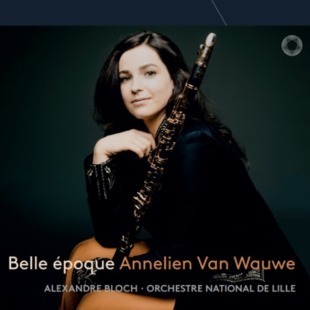
Belle époque
Clarinet works by Debussy, Manfred Trojahn, Pierné, Brahms and Widor
with Orchestre National de Lille
Alexandre Bloch conductor
Debussy’s Première Rhapsodie emerges gradually from the mists, immediately establishing the Belgian clarinettist’s warm, elegant tone and easy legato. Trills are evenly placed and the high notes are floated without becoming pinched… The most interesting item on the disc is undoubtedly the Trojahn Rhapsodie…The Reverie opens in suitably dreamy mode but soon turns nightmarish, with huge plunges from stratospheric top notes to the bottom…while the Caprice is a helter-skelter high-wire act for the soloist which Van Wauwe navigates with aplomb.
Guy Rickards, Gramophone, December 2019
The muted opening of the Debussy Première Rhapsodie is beautifully played here… It is a piece that requires great skill and control in both the soloist and orchestra, something that is clear in this superb performance, which has quickly replaced my other accounts as favourite… The playing throughout is very good, with Annelien Van Wauwe proving herself a formidable clarinettist, especially in the Manfred Trojahn work, although it is in the French pieces that she really shines. The Orchestre National de Lille and Alexandre Bloch are in perfect partnership with the soloist, making this a most interesting and enjoyable disc. The recorded sound is clear and bright and the booklet notes give a good introduction to each of the composers and their music. A very welcome disc of music for clarinet and orchestra.
Stuart Sillitoe, Music Web International, August 2019
Annelien Van Wauwe is already a consummate artist and this well-planned disc gives us an excellent view of her technical skill, her musicianship and her lovely tone, even in the altissimo register.
Roger Nichols, BBC Music Magazine, November 2019
Annelien van Wauwe gives an atmospheric performance.
James Jolly, The Listening Room/Gramophone blog, 19 August 2019
Seductive sounds of a golden era … A CD that is full of charm.
Ivan Hewett, Daily Telegraph,17 August 2019
Gorgeous clarinet sound; rich orchestral playing … a fine recording as well.
Andrew McGregor, BBC Radio 3 Record Review, 14 August 2019
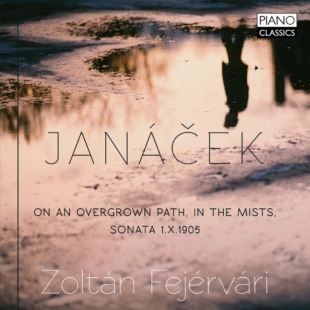
Janáček – Solo Piano Works
His new Piano Classics disc of the piano music of Leoš Janáček is the most sensitive and deeply probative recording of the Czech master I have heard… These deliciously understated performances reward repeated listening. I look forward to hearing more of the purity and imagination of Fejérvári’s piano playing.
Patrick Rucker, Gramophone, August 2019
After its first performance, Janáček tried to destroy his “sonata”, written in memory of a Czech patriot killed during protests in Brno in 1905. But the pianist Ludmila Tučková rescued two movements, played them to the composer in his old age and encouraged their publication. It’s an idiosyncratic work, and the second movement, Death, aches with sadness. The two collections of shorter pieces are idiomatically played by this young Hungarian.
Hugh Canning, Sunday Times, 2 June 2019
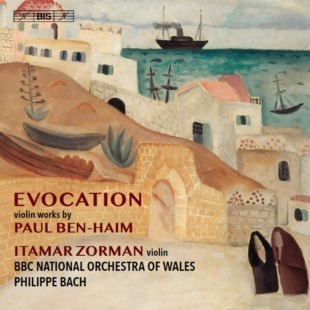
Evocation Violin Works by Paul Ben-Haim
with BBC National Orchestra of Wales
Philippe Bach conductor
Amy Yang piano
The one constant throughout this entire collection is violinist Itamar Zorman, who performs all of this music with passion and excellence… This is a very enjoyable collection of music from a lesser-known composer.
Mark Novak, Fanfare, September/October 2019
* * * * The most important work here is the Concerto, which was also successfully recorded by Itzhak Perlman (EMI) back in the early 90s. However, it is replaced here in an equally fine performance in BIS’s very fine SACD sound, and rounded out with the remainder of the composer’s catalogue for the instrument. Zorman, a Tchaikovsky laureate, provides captivating performances throughout the disc, consolidating his position as advocate for the under-heard Ben-Haim.
Brett Allen-Bayes, Limelight Magazine, 15 July 2019
This project has obviously been a labour of love for Itamar Zorman, whose playing – on a 1734 Guarneri ‘del Jesu’ – is technically impeccable. Zorman is attentive to the music’s humorous moments – say, in the Ballad from Songs Without Words – but also achieves great expressive heights, while being always conscious of a piece’s larger shape. … A rousing Toccata, skilfully arranged from a piano showpiece, brings this rewarding recital to its exciting close.
Carlos Maria Solare, The Strad, June 2019
Evocation (1941) is the highlight here. The gently undulating introductory pages set the tone for the soloist’s wistful main theme, its elegiac contours complemented by limpid harp – and woodwind – writing in the agitated central section, before a heightened resumption of earlier music brings a lithe cadenza and regretful close. Itamar Zorman offers committed advocacy here and in the Violin Concerto (1960).
Richard Whitehouse, Gramophone, June 2019
A peach of a work [Evocation] reflective but troubled, it’s the earliest piece in this rewarding collection of works … Zorman retraces Ben-Haim’s musical journey with plenty of technical panache, passion and colour.
Geoff Brown, BBC Music Magazine, June 2019
This compilation of violin works, compellingly performed by Itamar Zorman with the BBC National Orchestra of Wales on a Swedish label, yields in its title track something verging on revelation… You will not meet many unheard concertos [Yizkor – Evocation] of such wistful and appealing qualities, passionately evoked by an emphatic soloist… Zorman fills out the album with pieces for violin and piano, and violin solo. I don’t think I’ve ever heard a warmer or more enjoyable Ben-Haim program.
Norman Lebrecht’s Lebrecht Listens, Ludwig Van Toronto, 26 April 2019
The young Israeli violinist Itamar Zorman (born in 1985) attends to all these works with the utmost conviction, shining with a clear, always expressive tone… Technically, of course, this is completely flawless, which is immediately evident, especially in the cadenzas and etudes. Both in the Swiss Philippe Bach – currently GMD at the Meininger Staatstheater – and in the pianist Amy Yang, he seems to have found ideal partners for this sensitive, never intrusive music.
Martin Blaumeiser, Klassik Heute, 14 April 2019
Itamar Zorman is the soloist and this, not his first release, is a major statement in his career. Zorman previously released a violin and piano album with more conventional repertoire but this is his first release playing with an orchestra. Having demonstrated his facility with the conventional repertoire he seems to be blazing a path beyond.
New Music Buff, April 2019
Zorman’s technique in performing those studies [Three Studies for Solo Violin] is impressive, as it is over the course of the entire
album.
Stephen Smoliar, The Rehearsal Room, April 2019
Three Studies for Solo Violin (1981), written for Yehudi Menuhin [are] the outstanding works on this disc, titled Evocation (BIS). It’s superbly played by the young violinist Itamar Zorman.
Fiona Maddocks, The Observer, 31 March 2019
…with Zorman’s fiery playing, one soon warms to this ‘un-kitsch’, neoclassical music, where the most fragile piece is the violin concerto’s second movement. Think Itzhak Perlman sound in Schindler’s List, but with thirty percent fat. In addition, Zorman’s knowledge of folk music is reason enough to buy the record instead of streaming it. In the enthusiastic CD booklet, he points out exactly where Ben-Haim uses Arabic melody… You open your ears in completely new ways. Which is, of course, also the meaning behind this migrant music and its desire for a rather more inclusive world.
Hanna Höglund, Sydsvenskan, 8 March 2019

BBT Commission: Heinz Holliger’s Reliquien
with Matthias Schorn clarinet
Gerold Huber piano
Commissioned by Anna Lucia Richter with support from the Borletti-Buitoni Trust
World premiere: 8 January 2019
Luxembourg Philharmonie
Holliger, here, is inspired by the short funeral music (D. 79) that a 16-year-old Schubert had written for himself: the voice, piano and clarinet explore together or separately all the nuances of the Schubertian sound. Most admirable here, perhaps, is the way Holliger, rather than just writing a bravura piece for her [Richter], penetrates the heart of his young interpreter’s vocal identity to feed his own writing, giving us a kind of sound X-ray of this performer’s extraordinary gift.
Dominique Adrian, ResMusica, 11 January 2019
Reliquien is… a very interesting examination of texts by Schubert… Richter’s interpretation was outstanding, every word, every phrasing expressed with intelligence and skill. And the soprano makes no difference between Holliger, Spohr and Schubert. All songs were performed with the same intensity and seriousness.
Alain Steffen, Tageblatt, 10 January 2019
…the direct effect [of the music] is undeniably physical and spiritual. The shaping of the work by the three protagonists at the premiere in the presence of the composer was exemplary.
Uwe Krusch, Pizzicato, 10 January 2019